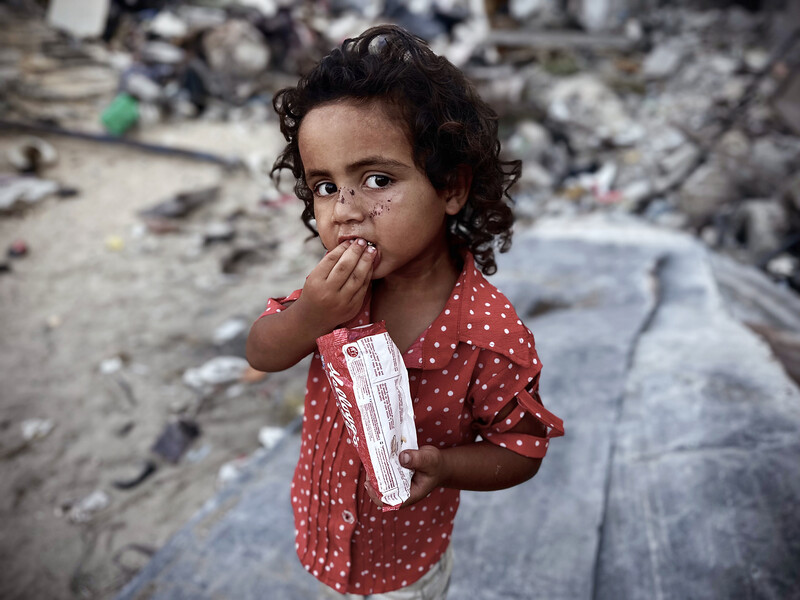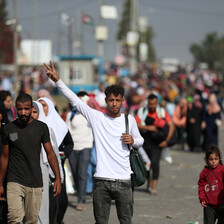The Electronic Intifada 28 November 2024

No one in Gaza, including children, is getting enough to eat as Israel uses starvation as a weapon of war.
ActiveStillsHere in Gaza, every loaf of bread – when one can be found – has a special taste. A sip of water, when available, has a unique flavor. A meal, no matter how meager, carries a distinct sense of satisfaction. And even amidst the bombing, there is a strange sense of peace found in sleep. Even fear, loss, sadness and hunger awaken oneself to appreciate hidden joys, a reminder of the essence of our humanity, far from the endless chase for luxury that knows no finish line.
My 5-year-old niece, Lana, seemed unusually cheerful, as if expecting something special. Curious, I asked, “Why are you so happy, Lana?” With a wide smile on her face, she replied, “I’m hungry, and I want to eat basil,” as if it were a party snack. The remark struck me. How could such desperation and happiness coexist?
It then dawned on me that children are truly resilient. They are among the hardest hit by the deprivation and harshness of war yet are usually the first to forgive, brush off the hardships, and get on with life.
Given the severe food shortages here in Gaza’s north, I consider myself incredibly lucky as occasionally we get to eat sandwiches of basil leaves mixed with oil and salt as a meal. My family created this type of sandwich, something we never ate before the war, given the scarcity of vegetables. Others are nowhere near this fortunate.
As Lana took a bite to eat, I noticed how she ate as slowly as she could, hoping the meal would last as long as possible. The other trick we Gazans have come to appreciate is to chew as slowly as we can for as long as possible so as to extend the time spent over a meal. Grateful for being able to eat but sad there isn’t more to go around, every bite we take is wrapped in delight and sadness in equal proportion.
As the sandwich shrank with every bite taken, Lana tried not to look. Instead, she imagined she was having her fill.
“I miss Baba”
Lana had lost her father a few weeks earlier. Moataz Rajab, a 37-year-old postgraduate in economics, is fondly remembered in the family as a very loving husband and father of four very young children, including a 1-year-old baby that will never get to know his father. Lana, terrified by the aerial bombings, tank shells and loud explosions, has yet to fully grasp the reality of her father’s absence. She sometimes says the gut-piercing words “Mama, I’m sad. I miss Baba,” as if he is at work and late coming home.
It seems that Lana’s deep sadness overshadows the fleeting joy from a basil sandwich. She is still too young to fully express her grief but understands that her father’s absence causes her pain. She believes it’s only temporary, a sadness that will fade once he returns. But she will wake up one morning and realize her Baba is gone and there is no coming back. She will come to realize that the sting of loss does not disappear, it transforms into a profound, persistent sorrow that seeps into our hearts as panic or into our eyes as tears.
No amount of words can describe the pain, discomfort and anxiety coupled with the feeling of hopelessness, despair and sadness that the people of Gaza are going through. From losing friends, memories, homes, familiar streets to the bustling neighborhoods we grew up in, it’s a nightmare loop.
This is not about our grief being greater than anyone else’s. In the end, it is hard to explain the pangs of labor and the pain of childbirth to someone who has never given birth. It is about losing a brother right after losing a best friend. It is about skipping meals, struggling with thirst and not knowing how to feed your children. It is about being repeatedly displaced after watching your home being blown into smithereens. We barely have time to process each loss before it is supplanted by a new grief.
The sorrow of our Gaza City is etched in our chests, visible on our faces. It’s as if our bodies have been soaked in sorrow for ages, as if our soil was mixed with anguish, and our sun casts misery with its light.
Sorrow has knocked on every door in Gaza. It is woven into every morsel we eat, everything we are able to see. Former business owners are now found queuing up for aid. Countless loved ones have left us without a proper farewell.
The lucky ones are those who are buried in one piece in a single grave. Others are buried in groups with missing body parts inside shrouds and body bags. Funerals are prayed for strangers and strangers have become friends before everyone is shuffled again in this chaos of repeated displacements.
Factory of sorrows
Gaza has become a factory of sorrows. The assembly line of death piling up and multiplying at breakneck speed.
Meanwhile, children are growing up too soon while countless women are bearing the burden of life amid this devastating war – doing exhausting and physical work they were not accustomed to before, all while enduring incredibly stressful conditions they could never have imagined. Our elders deal with the inexplicable pain of losing their children after investing their own youth in raising and educating them. Yet the one thing that holds it together for everyone in Gaza is our shared hope and resilience.
Satisfied with her bird-sized portion of a meal, Lana got back to playing with her siblings and cousins as the sound of war hovered across the sky. She giggled away as if living in a different dimension.
As I took a quick glance around, I noticed the fixed faces of my parents sitting solemnly side by side. I’m not sure what I see. Is it steadfastness or exhaustion? Are those smiles or tears? Can we ever go back to the way it was? Can someone who has heard the roaring sound of fire belts coming from every possible direction ever enjoy music? Can a child who once carried his brother’s body in a plastic bag laugh heartily again? Will a girl pulled from the rubble ever tell a joke someday?
This pain will not stop even when the war ends. Gaza will never be the same. This generation will not overcome the indelible scar until the siege and the illegal occupation ends.
That is unless Lana’s generation of resilience are given the chance to grow up in a place my grandparents’ generation dreamed of since their expulsion in 1948, exercising their right to return and achieving self-determination in our own country, Palestine.
Evidently it seems, desperation and happiness can coexist.
Asem Alnabih is an engineer and PhD researcher currently based in north Gaza. He serves as the spokesperson for the Gaza Municipality and has written for many platforms in both Arabic and English.





